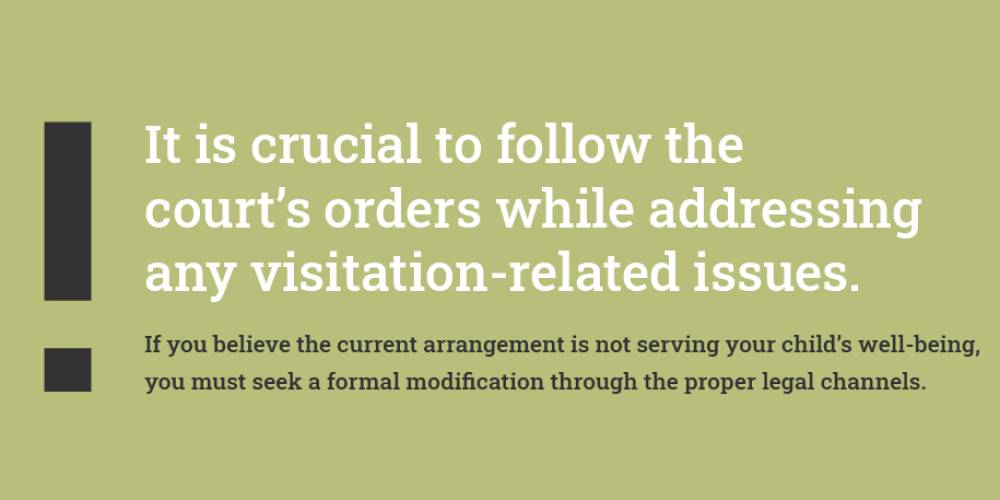630-462-9500
After Hour New Client Telephone Number 630-690-6077
1776 S. Naperville Road, Building B, Suite 202,
Wheaton, IL 60189
My Kid Doesn't Want to Go to Visitation. What Can I Do?
 Navigating custody and visitation issues while co-parenting after a divorce or separation can be challenging. It can become especially difficult if your child refuses to attend visitation with his or her other parent. If you find yourself in this situation, you might be unsure about what steps to take or what your legal obligations are. This sensitive situation requires balancing the best interests of your child, your rights, and the other parent's rights. An experienced Illinois family law attorney can help you better understand your legal rights and obligations while finding a resolution that works for everyone involved.
Navigating custody and visitation issues while co-parenting after a divorce or separation can be challenging. It can become especially difficult if your child refuses to attend visitation with his or her other parent. If you find yourself in this situation, you might be unsure about what steps to take or what your legal obligations are. This sensitive situation requires balancing the best interests of your child, your rights, and the other parent's rights. An experienced Illinois family law attorney can help you better understand your legal rights and obligations while finding a resolution that works for everyone involved.
Why Is My Child Refusing to Attend Visitation?
It is essential to understand the reasons behind your child's refusal to visit their other parent. Children may resist visitation for several reasons, including:
-
Emotional distress: Your child may be overwhelmed by the changes in the family structure. He or she might struggle to adjust to living in two separate households.
-
Conflict with the other parent: Tension or unresolved conflict between your child and the other parent can contribute to this reluctance.
-
Parental alienation: Sometimes, one parent may intentionally or unintentionally influence the child's feelings toward the other parent, which can affect their willingness to attend visitation.
-
Abuse or neglect concerns: If your child feels unsafe or is mistreated during visitation, he or she may not want to spend time with the other parent.
Talking to your child in an age-appropriate manner can help you acquire insight into his or her concerns and emotions. It is important to create a safe space for your child to share his or her feelings without fear of judgment or punishment.
Am I Required to Enforce Visitation in Illinois?
As a custodial parent, you are generally required to comply with the court-ordered parenting plan or visitation schedule. Under Illinois law, both parents have a legal right to parenting time. A parent who does not allow court-ordered visitation could face serious consequences, such as contempt of court, fines, or even changes to the custody arrangement.
However, there are exceptions to this rule. If you believe your child's safety is at risk during visitation, you may need to take immediate legal action and file an emergency motion to modify parenting time. Do not try to handle the situation on your own by refusing visitation, as this could result in legal penalties.
Should I Force My Child to Attend Visitation?
While you are legally obligated to obey the court-ordered visitation schedule, forcing your child to attend visitation can heighten emotional distress and strain your relationship with him or her. It is crucial to find a balance between enforcing the court order and addressing your child's emotional needs. Consider implementing the following steps:
-
Encourage and reassure: Let your child know that spending time with both parents is important and that both you and the other parent love him or her.
-
Avoid placing blame: If your child senses hostility between you and the other parent, it may increase his or her resistance to visitation, so strive to keep communication civil and respectful.
-
Seek professional help: A family therapist or counselor can help your child work through his or her feelings and improve his or her relationship with the other parent.
While encouraging visitation, be mindful of your child's legitimate concerns. For instance, if he or she expresses fear or discomfort about visiting the other parent, you should take these concerns seriously and further investigate.
What Can I Do If My Child Still Refuses to Go?
If your child continues to refuse visitation despite your efforts, there are steps you can take to address the issue without violating the court order. These steps include:
-
Documenting the situation: Keep a record of your child's refusal and the steps you have taken to encourage visitation. Include details about what your child has said and done, along with your communication with the other parent about the issue.
-
Communicate with the other parent: Inform the other parent about the situation and discuss possible solutions. Be transparent about your child's concerns while focusing on collaboration rather than blame.
-
Seek court intervention if necessary: If the problem continues, you can file a motion with the court to address your concerns and propose changes to the visitation arrangement.
-
Involve a family mediator: A neutral third party can help facilitate productive discussions between you and the other parent, making it easier to find common ground.
Remember, you cannot force the other parent to agree to changes. If the situation cannot be amicably resolved, the court may need to step in to determine the appropriate course of action.
Can a Child Decide Not to Visit a Parent?
In Illinois, there is no specific age at which a child can refuse visitation or choose which parent he or she wants to live with. While the court may consider the child's preferences as part of its decision-making process, it is not the only determining factor. The court's primary focus is always on the child's best interests. Factors the court may consider when evaluating a child's preferences include:
-
The child's age and maturity level
-
The reasons behind the child's preference
-
Whether one parent influences the preference
-
Whether the visitation arrangement is serving the child's emotional and physical well-being
If your child is old enough and mature enough to express his or her preferences, it may be worth discussing his or her concerns with the court through a guardian ad litem or child representative. These professionals advocate for the child's best interests and can provide valuable insights during custody and visitation disputes.
What Happens If I Do Not Comply With the Visitation Order?

Failing to comply with a visitation order can have serious consequences. Under state law, the court can penalize a parent who interferes with or denies the other parent's court-ordered visitation. Possible consequences include:
-
Contempt of court, which could result in fines or even jail time
-
Mandatory counseling or parenting classes
-
Modifications to the existing custody or visitation arrangement
It is crucial to follow the court's orders while addressing any visitation-related issues. If you believe the current arrangement is not serving your child's well-being, you must seek a formal modification through the proper legal channels.
Contact a DuPage County, IL Visitation Lawyer
When your child does not want to attend visitation, it can be a stressful situation for everyone involved. Understanding your legal obligations and finding the right approach can help you effectively address the issue. For guidance and support, contact a dedicated Wheaton, IL family law attorney at The Stogsdill Law Firm, P.C.. Call 630-462-9500 today to schedule a consultation and learn how we can help you with your parenting time concerns.




















